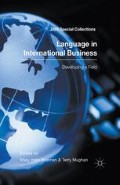Abstract
This review of the treatment of language as a concept in international business (IB) in the Journal of International Business Studies (JIBS) reveals thematic and chronological patterns that are representative of the development of an important field in IB research. The interest in language acquisition as part of the IB curriculum in the 1980s and 90s directly reflected the growth of IB as a distinct area of business and management and the emphasis on the nation-state as the key geographical entity in IB theory. The over-simplified association of a single national language with the nation-state completely overshadowing regional languages and dialects defies the reality of many markets1 and excludes large numbers of consumers from the potential reach of the firm. The increase in global trade and investment which has happened over the last few decades has brought with it greater competition, complexity and uncertainty as China, India and other newcomers have jostled for their place in the global order, causing many practitioners to propose that only the use of English as a corporate lingua franca could bring order and efficiency to this diversity (Neeley, 2012). However, it is interesting to note that throughout the recent period both national2 and transnational3 bodies have continued to produce large-scale policy and educational studies affirming the centrality of language competence to cross-national communication, trade relations and business performance.
Access this chapter
Tax calculation will be finalised at checkout
Purchases are for personal use only
Preview
Unable to display preview. Download preview PDF.
References
Adler, N. J., & Graham, J. L. (1989). Cross-cultural interaction: The international comparison fallacy? Journal of International Business Studies, 20(3), 515–537.
Barner-Rasmussen, W., Ehrnrooth, M., Koveshnikov, A., & Makela, K. (2014). Culture and language skills as resources for boundary spanning within the MNC. Journal of International Business Studies, 45(7), 886–905.
Brannen, M. Y. (2004). When Mickey loses face: Recontextualization, semantic fit, and the semiotics of foreignness. Academy of Management Review, 29(4), 593–616.
Brannen, M. Y., & Doz, Y. L. (2012). Corporate languages and strategic agility. California Management Review, 54(3), 77–97.
Brannen, M. Y., & Thomas, D. C. (2010). Bicultural individuals in organizations implications and opportunity. International Journal of Cross Cultural Management, 10(1), 5–16.
Brannen, M. Y., Piekkari, R., & Tietze, S. (2014). The multifaceted role of language in international business: Unpacking the forms, functions and features of a critical challenge to MNC theory and performance. Journal of International Business Studies, 45(5), 495–507.
Goby, V. P., & Nickerson, C. (2015). Multicultural and multilingual: Workplace communication in Dubai. The Routledge Companion to Cross-cultural Management, eds. Holden, N., Michailova, S., & Tietze, S. Routledge, Abingdon, UK.
Green, R. T., & White, P. D. (1976). Methodological considerations in cross-national consumer research. Journal of International Business Studies, 7(2), 81–87.
Hinds, P. J., Neeley, T. B., & Cramton, C. D. (2014). Language as a lightning rod: Power contests, emotion regulation, and subgroup dynamics in global teams. Journal of International Business Studies, 45(5), 536–561.
Hofstede, G. (1984). Culture’s Consequences: International Differences in Work-Related Values (Vol. 5). Thousand Oaks, CA: Sage.
Janssens, M., & Steyaert, C. (2014). Re-considering language within a cosmopolitan understanding: Toward a multilingual franca approach in international business studies. Journal of International Business Studies, 45(5), 623–639.
Johanson, J., & Vahlne, J. -E. (1977). The internationalization process of the Firm—A model of knowledge development and increasing foreign market commitments. Journal of International Business Studies, 8(1), 23–32.
Liu, L. A., Adair, W. L., & Bello, D. C. (2015). Fit, misfit, and beyond fit: Relational metaphors and semantic fit in international joint ventures. Journal of International Business Studies, 46(7), 830–849.
Luo, Y., & Shenkar, O. (2006). The multinational corporation as a multilingual community: Language and organization in a global context. Journal of International Business Studies, 37(3), 321–339.
Mughan, T. (2015) Language and languages: moving from the periphery to the core, The Routledge Companion to Cross-Cultural Management, eds. Holden, N., Michailova, S., & Tietze, S. Routledge, Abingdon, UK.
Neeley, T. (2012). Global business speaks English. Harvard Business Review, 90, 116–124.
Piekkari, R., Welch, D. E., & Welch L. S. (2014). Language in International Business: The Multilingual Reality of Global International Expansion, Edward Elgar Publishing, Cheltenham, UK.
Reiche, B. S., Harzing, A. W., & Pudelko, M. (2015). Why and how does shared language affect subsidiary knowledge inflows? A social identity perspective. Journal of International Business Studies, 46(5), 528–551.
Ronen, S., Gonçalves, B., Hu, K. Z., Vespignani, A., Pinker, S., & Hidalgo, C. A. (2014). Links that speak: The global language network and its association with global fame. Proceedings of the National Academy of Sciences, 111(52), E5616–E5622.
Santacreu-Vasut, E., Shenkar, O., & Shoham, A. (2014). Linguistic gender marking and its international business ramifications. Journal of International Business Studies, 45(9), 1170–1178.
Schwartz, S. H., & Sagiv, L. (1995). Identifying culture-specifics in the content and structure of values. Journal of Cross-Cultural Psychology, 26(1), 92–116.
Steyaert, C., Ostendorp, A., Gaibrois, C. (2011). Multilingual organizations as ‘linguascapes’: Negotiating the position of English through discursive practices. Journal of World Business, 46(3), 270–278.
Sui, G. L. (2016). Do You Speak Singlish. May 13, New York Times.
Tenzer, H., Pudelko, M., & Harzing, A.-W. (2013). The impact of language barriers on trust formation in multinational teams. Journal of International Business Studies, 45(5), 508–535.
Trompenaars, F. (1993). Riding the Waves of Culture, Nicholas Brealey, London.
Volvo Group Magazine (2016) Ung Talang: Sä hittar Volvokoncernen mogondagens medarbetare, Volvo Group Magazine, Operations, 2, 23.
Welch, D. E, & Welch, L. S. (2015). Developing multilingual capacity: A challenge for the multinational enterprise. Journal of Management, July (Vol. 8), DOI: 10.1177/0149206315594846.
Editor information
Editors and Affiliations
Rights and permissions
Copyright information
© 2017 The Editor(s)
About this chapter
Cite this chapter
Mughan, T., Brannen, M.Y. (2017). Conclusion. In: Brannen, M.Y., Mughan, T. (eds) Language in International Business. JIBS Special Collections. Palgrave Macmillan, Cham. https://doi.org/10.1007/978-3-319-42745-4_11
Download citation
DOI: https://doi.org/10.1007/978-3-319-42745-4_11
Publisher Name: Palgrave Macmillan, Cham
Print ISBN: 978-3-319-42744-7
Online ISBN: 978-3-319-42745-4
eBook Packages: Business and ManagementBusiness and Management (R0)

